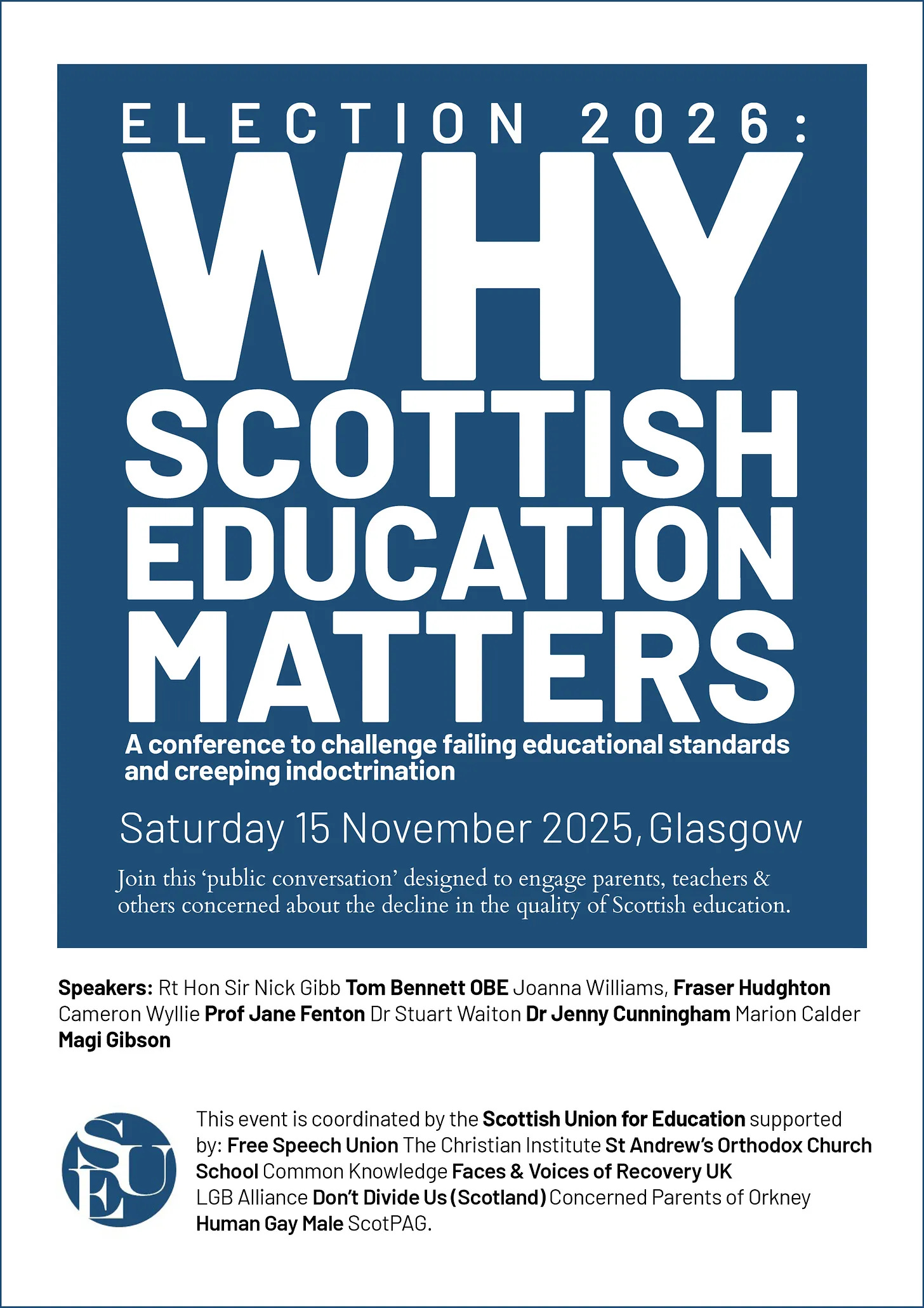Why Scottish education matters – even if you don't live in Scotland
Labour's new curriculum review has left many of us worried it will lead to dumbing down in England and Wales. Here, Stuart Waiton explains why we have much to learn from the disasters in Scotland.
As Scotland slides down the international league table of basic educational standards, and concerns mount about behaviour in schools and the social-justice activism of teachers, the Scottish Union for Education (SUE) has organised a conference ahead of next year’s Scottish Parliament election, Election 2026: Why Scottish Education Matters, on Saturday 15 November in central Glasgow to urge our politicians to put education back on the agenda.
A LEARN-LITTLE CURRICULUM
Sir Nick Gibb, a long-time minister of state for schools in Westminster, will be addressing the conference, explaining how Scotland’s national curriculum, the Curriculum for Excellence – prepared by Labour and implemented 15 years ago by the SNP – is a ‘monument to progressive ideology’, one that has left us with a curriculum where ‘content was absent’.
Journalist and author Joanna Williams, who will also be speaking at the conference, explains that:
‘Scottish education, once the envy of the world, is now failing children as schools employ progressive teaching methods and promote contested political viewpoints rather than subject knowledge. But transformation is possible. Sir Nick Gibb, in his excellent book, Reforming Lessons, shows how a focus on evidence-based approaches to teaching, a knowledge-rich curriculum and orderly classrooms can lead to higher standards.’
Behaviour ‘tsar’ Tom Bennett OBE will also address the conference and raise his concerns about the lack of structure and discipline needed for schools to operate. As Scottish schools become ever more ‘child centred’, Bennett points to the need for rules, manners, sanctions and adult authority to help get things back on track. Perhaps the lack of this disciplined approach in too many schools helps to explain why working-class kids are doing so badly and why the government has failed to close the ‘attainment gap’.
WHATEVER HAPPENED TO KNOWLEDGE?
But the conference is not only about the attainment gap. We will also discuss the lack of inspiration and high standards in our schools. For example, English teachers have confirmed to SUE that the Higher (equivalent to the first year of an A-level) in English can be gained without a student reading a single novel!
For SUE, a clear problem with both standards and behaviour is the fact that adult authority in the context of a school can only come from teachers who are experts, who have a depth of knowledge, and who work within an education system that ensures that this knowledge is seen as something that is vital and that must be passed on to the next generation. Authority and authoritative teaching are not based simply on personalities or techniques, they are founded on a will, and a sense of meaning and purpose, established through a passion and understood need to teach children ‘the best that has been thought and said’.
The current knowledge-light curriculum disempowers teachers, degrades their expertise and deprives children of the beauty and brilliance once associated with Scottish education.
IDEOLOGY OVER INSPIRATION
Part of the problem with Scottish schools is the training that is on offer for aspiring teachers. Two years ago, a leading educational theorist explained to me that it would be unlikely that an individual who did not follow the social-justice doctrine of the educational establishment would be allowed to teach. At the time, I wondered to what extent that was true. Subsequently, SUE has heard from several student teachers that failure to adopt this outlook would lead to them being failed. This should come as no surprise, given the General Teaching Council’s open promotion that being a teacher is all about social justice.
Part of this social justice agenda today means that, in theory, every subject should teach ‘anti-racism’ to children. Because concepts from this highly contested ideology, based on critical race theory, are infused throughout the curriculum, Scottish children are being educated about their ‘whiteness’ and ‘white privilege’, or alternatively, their victimhood. Which begs the question, are schools places where a liberal and open discussion about issues is still possible, or have they become places where a new ‘correct’ dogma is given to them? The issue of freedom of thought and speech is one that Fraser Hudghton of the Free Speech Union will be addressing at the conference.
Concerns about a new dogma in schools will also be addressed by the brilliant Marion Calder of For Women Scotland. Helped by LGBT Youth Scotland clubs in schools and the purported ‘anti-bullying’ charity Time for Inclusive Education, transgender ideology continues to be promoted in Scottish schools – despite the UK Supreme Court ruling clarifying the legal definition of ‘woman’ and the doubts cast by the findings of the Cass Review of gender identity services for children and young people. Parents whose children have been socially transitioned (‘transed’) by schools will be with us to discuss what is happening and what we can do to challenge an approach that denies biological reality and potentially harms children.
JOIN US
The debate around next year’s election is a vital opportunity to highlight what is going wrong with Scottish education. But many of the same trends are apparent across the UK. If you believe our children deserve better, please get a ticket and join us on Saturday 15 November.
Stuart Waiton is chair of the Scottish Union for Education. He is a senior lecturer in sociology and criminology, an author and a journalist, with a particular interest in the overregulation and policing of everyday life.




It used to be the envy and then……
Great piece. Scotland!!!!!!!
Have cross posted
https://dustymasterson.substack.com/p/flash-gordon
Dusty